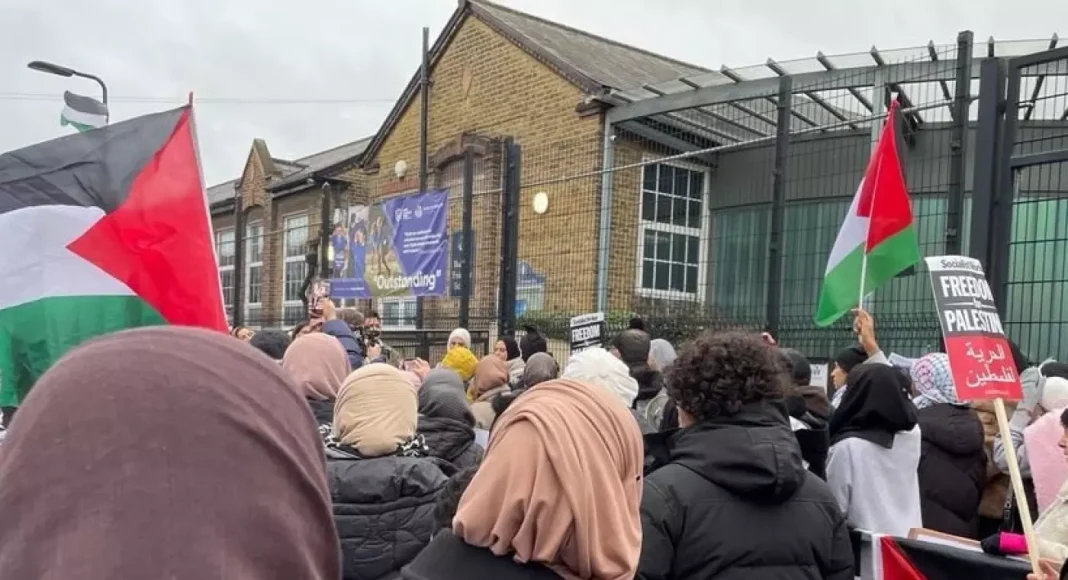Prevent is a supposed counter-terrorism programme, part of ’Contest’, an official strategy of the British government designed to police political views in the name of fighting extremism. It aims to intervene in the lives of people who are deemed vulnerable to radicalisation but before they actually have committed any offence. Prevent requires staff at public institutions such as schools, hospitals, universities, etc, to report any individuals they deem at risk. The programme started in 2003, and until 2011 it solely focused on ‘Islamist extremism’, with the Prevent budget for a region being allocated based on its Muslim population size.
If a person is referred to Prevent, a police record of their case is placed on the Prevent Case Management Database and the police then give the final say on whether that person is indeed vulnerable to becoming involved in terrorist offences. Once this assessment is made, they are referred to the ‘Channel panel’, which may advance them to Channel, the stage after Prevent where multiple agencies ‘safeguard’ people seen as vulnerable to terrorism.
According to the government, extremism is ‘The vocal or active opposition to our [British] fundamental values’; among these values are democracy, the rule of law, individual liberty and mutual respect and tolerance. Prevent guidance expands on this but only slightly, citing examples of vulnerabilities to terrorism as ‘[being] aggrieved about domestic government policies and or international affairs’ or ‘a misconception and/or rejection of UK foreign policy’ and ‘a distrust of western media reporting’. This essentially criminalises criticism of the government and silences young people who fear the repercussions of expressing their political views due to the risk of being referred to Prevent. Prevent training slides for employees in public institutions have included logos of legal organisations including the Palestine Solidarity Campaign, Extinction Rebellion and the RCG; training also highlighted anti-capitalism as a form of extremism, painting a target on the back of any student who chooses to support Palestine or oppose the capitalist system through political organisations and their events. The goal is clear: demobilise the youth.
Due to the vague definition of extremism, staff tend to refer people even when they are not sure it is necessary. A report on Prevent by Amnesty International published in December 2023 mentioned one secondary school teacher saying she would rather refer a student than risk negative repercussions.
Schools become spy agencies
One area in which this is particularly damaging is in education where most Prevent referrals are made (36%). Teachers are given Prevent training, students are given tutorials on how to spot people who may be vulnerable to terrorism and are told to report them, classrooms become more censored with fewer students feeling safe to express their actual opinions, certain external speakers are refused entry based on beliefs they have, limiting the range of voices heard on issues. This has recently been seen in regard to the issue of Palestine in schools since October 2023. CAGE, a British organisation fighting against the UK’s anti-terrorism laws by providing legal aid to those affected by them, has noted a 455% increase in the number of cases since the last upsurge in 2011, having handled 214 cases between October and December 2023 alone, the vast majority of which were school, college or university cases.
CAGE reported that among the tactics to stifle Palestine solidarity in schools are enforcing the removal of Palestine symbols or clothing, putting students in isolation, imposing sanctions or expulsions, and even criminal investigations. Barclay Primary School in Leyton, east London wrote warning letters to parents in November 2023 threatening to refer them and their children to Prevent for the wearing of flags and stickers in support of Palestine during a non-uniform day, stating: ‘Inappropriate comments made at school or demonstrated at school, including extremist or divisive comments, can and will lead to formal meetings with the school, referrals to the Prevent Team or the Hate Crime Team’.
CAGE also found a serious double standard in schools between responses to the Russia-Ukraine conflict and the response to the Gaza genocide. They also pointed out the inherent Islamophobia in Prevent stating that 209 out of the 214 cases handled since October 2023 involved Muslims. Considering the roots of Prevent this comes as little surprise, and the fearmongering around Islam and terrorism in the media also no doubt has played a role, with a study from the ‘Re/presenting Islam on campus’ research project on university students having found a correlation between a belief in the necessity for Prevent to tackle the issue of radicalisation in schools and negative views of Islam and Muslims. Students at universities have cited a difficulty in booking pro-Palestinian activists as speakers, with universities requiring certain forms to be submitted in order to align with the requirements of Prevent, but the students often do not have the capacity to meet these demands and deadlines.
Prevent has installed a culture of fear in schools, colleges and universities targeting Palestine support particularly over the past nine months. What is clear is that this is an affront to our rights to freedom of expression, and our freedom to peaceful assembly. We must do everything in our power to fight against Prevent and highlight what the programme really is, another cog in the capitalist machine to keep us docile and keep us uncritical.




